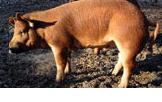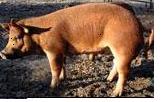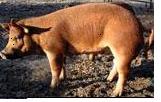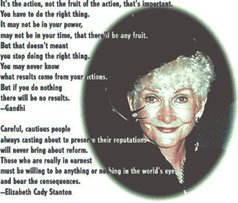ARCADIAN KLINKENBORGIAN COMMA ERRORS
SUZANNE

MAGNUS

CHERYL

I’m sick of Verlyn Klinkenborg’s hogs. I’m sick of his horses. I hate the chickens. I will vomit if he rhapsodizes one more time about the poetry of something’s pushing up through the earth at his Gilbert-and-Sullivan five-acre farm.
he rhapsodizes one more time about the poetry of something’s pushing up through the earth at his Gilbert-and-Sullivan five-acre farm.
I don’t believe there is a Verlyn Klinkenborg. People don’t name their children “Verlyn,” especially attached to "Klinkenborg.” Such names make school-yard life misery.
I grew up on and off my grandma’s Georgia farm. Georgia farmers would no more exult in public about the metaphysics of hog mating than they would wear kilts to slop the pigs.
Minnesota farmers—Klinkenborg alleges picturesque Minnesota family to which he attributes quotes—wouldn’t either. We lived in Minneapolis four years while my husband was at the University of Minnesota. Laconic Minnesota farmers proved more effusion-wary than Georgia farmers.
Klinkenborg rhapsodizes about pork’s tasting better when you hand-feed pigs until you slaughter them a few feet from where they grew up. He serves up this evanescent hooey to befuddle city slickers. Hand-fed grease tastes the same and clogs arteries like that we buy in Publix.
Verlyn’s hustle is ancient back-to-nature shtick: Arcadian glades, sylvan dells, anthropomorphized animals. The Sun King’s court manifested such bunko in the queen’s attendants’ affecting milk-maid couture.
Klinkenborg dumps on towns: "The one thing that characterizes nearly all of these places—south of Denver, north of Sacramento, west of Des Moines—is a certain biological sterility. This is the land of hand sanitizer. What Americans love about their lawns isn’t just the greenness and the uniformity. It’s the way a well-mowed lawn betrays any mess. A lawn is an informer, which is why it is the preferred landscape of the America that lives by covenant.”
What in the hell does “betrays any mess” mean? Does it mean that a neat lawn repudiates country botaninc xeriscape? Will somebody explain the sentence about a lawn’s being an “informer”? Does it mean that the burbs rank contemptible because city folk insist on red lights whereas the hills-and-dales denizens eschew traffic signals to steer by the stars, the seasons, or a feeling in their upper right quadrant? Spinoza doesn’t try to pull off such gauzy piffle, and Spinoza has more abstruse concepts than hog mating about which to declaim.
Tapping into enduring superstition, Klinkenborg casts himself as born-again rustic returned to the land, whence he writes flapdoodle about greater authenticity of rural as opposed to city life. He peddles this ancient scam to New York Times editorial suckers, who accord him prime marquee in “Times Select”
.
Before Klinckenborg commences paean to chitterling preparation, he should repose himself near his cot under picturesque bough and review his grammar primer.
His commas show no more elegant than do his conjugal hogs.
His overuses superfluous adverbs against which Strunk & White pleads.
Gilbert White’s note, yesterday, from Alton and today’s, from South Lambeth, record part of his journey to visit his brothers in London.
“Yesterday” and “from South Lambath” are restrictive adverb and adverbial prepositional phrase: neither gets commas.
I’ll fill in, for these dates, from another year.
"For those dates" is a restrictive adverbial prepositional phrase: no commas.
When the Tamworth breeder came to pick up Magnus, Cheryl, and Suzanne, she said something that made it clear to me why she’s a successful breeder and I’m not (so far).
Here Verlyn needs a comma after “breeder” for compound sentence. Magnus, Cheryl, and Suzanne are remaining hogs after Verlyn supervised the murder of two for bacon that tastes better because of the blood ritual he supervised a few feet from where these unfortunates grew up.
Pasture, yes, but not the fencing really needed to make it easy to work with sexually mature pigs.
"Really" is a redundant adverb. "Sexually mature" is too prurient for Arcadia. Verlyn gets so carried away with the complexities of “sexually mature pigs” that he falls into the dreaded fragment. We’ll accept an artful fragment from Proust, but not from Verlyn.
Time, too, but not enough of it to really slow down. Purpose, as well, but not so much that I couldn’t be daunted by knowing I had made a mistake.
Verlyn indulges in another redundant adverb, passive verb, and fragment.
Revving up to soar into the empyrean on the wings of hog metaphysics trips Verlyn into two fragments in a row.
What I felt that day surely doesn’t matter, except for this.
Verlyn should dump superfluous adverb “surely” and omit the comma: restrictive phrase.
I watched and helped the farmer and his son who came to do the work, because I would do the work myself if I had the skill.
The trailing adverbial clause is restrictive: no comma.
That is partly what I mean by taking responsibility for what I eat. But it is also a way of acknowledging the astounding transition that takes place when a pig is butchered—something you must experience to understand. Out of the shame of death, the start of blood, comes the beauty—and, in many cultures, the comedy—of a pig’s generous flesh. This really cannot be explained, especially to anyone who is disgusted by the idea of eating meat or eating an animal you have raised yourself. But it is something that rural people have nearly always known.
See all those pronouns with no antecedents? Those are dead giveaway for a writer’s straining for for the transcendent ineffable but making the reader do all the work of guessing what these free-floating pronouns refer to somewhere in the upper reaches of the sublime. Pile up of antecedent-bereft pronouns is bad, inexact writing. Ask Magnus, Cheryl, and Suzanne.
And yet the book cannot be digitized any more than one could digitize the vague, inarticulate sense I have that I know where that quotation is, if only I could find the book it's in.
No comma after “is”: the comma cuts off a restrictive adverbial clause.
The books themselves are not really worth restoring, of course. One is to go on handling the paperbacks ever more carefully until the time, which doesn't really seem that far away, when all that remains is neatly organized piles of yellow dust on the bookshelves.
Verlyn's proliferating "really's" make him sound like a Valley Girl. The "which" clause is a restrictive adjectival clause modifying "time": no commas.
It is easier to remember just where a passage appears, spatially, than exactly what it says.
16 words
In this wordy sentence, “spatially” is restrictive: no commas.
Edit: "Where a passage appears is easier to remember than what it says." 12 words
I can often picture just where I need to look inside a book, though I can't remember for the life of me where the book is actually shelved. 28 words
Passive verbs weaken a sentence and make it longer.
Edit: “I can picture where I should look inside a book but can’t remember where I shelved the book. 19 words
The thought of remapping my literary memory is simply too much to stand.
Redundant adverb
Jane Austen's autograph letters to her sister, Cassandra, were not quite as fresh as the day they were written, perhaps, but even they were fresh enough to last another few centuries.
Austen had one sister. “Cassandra” is thus restrictive appositive: no commas. Dump redundant modifiers.

MAGNUS

CHERYL

I’m sick of Verlyn Klinkenborg’s hogs. I’m sick of his horses. I hate the chickens. I will vomit if
 he rhapsodizes one more time about the poetry of something’s pushing up through the earth at his Gilbert-and-Sullivan five-acre farm.
he rhapsodizes one more time about the poetry of something’s pushing up through the earth at his Gilbert-and-Sullivan five-acre farm.I don’t believe there is a Verlyn Klinkenborg. People don’t name their children “Verlyn,” especially attached to "Klinkenborg.” Such names make school-yard life misery.
I grew up on and off my grandma’s Georgia farm. Georgia farmers would no more exult in public about the metaphysics of hog mating than they would wear kilts to slop the pigs.
Minnesota farmers—Klinkenborg alleges picturesque Minnesota family to which he attributes quotes—wouldn’t either. We lived in Minneapolis four years while my husband was at the University of Minnesota. Laconic Minnesota farmers proved more effusion-wary than Georgia farmers.
Klinkenborg rhapsodizes about pork’s tasting better when you hand-feed pigs until you slaughter them a few feet from where they grew up. He serves up this evanescent hooey to befuddle city slickers. Hand-fed grease tastes the same and clogs arteries like that we buy in Publix.
Verlyn’s hustle is ancient back-to-nature shtick: Arcadian glades, sylvan dells, anthropomorphized animals. The Sun King’s court manifested such bunko in the queen’s attendants’ affecting milk-maid couture.
Klinkenborg dumps on towns: "The one thing that characterizes nearly all of these places—south of Denver, north of Sacramento, west of Des Moines—is a certain biological sterility. This is the land of hand sanitizer. What Americans love about their lawns isn’t just the greenness and the uniformity. It’s the way a well-mowed lawn betrays any mess. A lawn is an informer, which is why it is the preferred landscape of the America that lives by covenant.”
What in the hell does “betrays any mess” mean? Does it mean that a neat lawn repudiates country botaninc xeriscape? Will somebody explain the sentence about a lawn’s being an “informer”? Does it mean that the burbs rank contemptible because city folk insist on red lights whereas the hills-and-dales denizens eschew traffic signals to steer by the stars, the seasons, or a feeling in their upper right quadrant? Spinoza doesn’t try to pull off such gauzy piffle, and Spinoza has more abstruse concepts than hog mating about which to declaim.
Tapping into enduring superstition, Klinkenborg casts himself as born-again rustic returned to the land, whence he writes flapdoodle about greater authenticity of rural as opposed to city life. He peddles this ancient scam to New York Times editorial suckers, who accord him prime marquee in “Times Select”
.
Before Klinckenborg commences paean to chitterling preparation, he should repose himself near his cot under picturesque bough and review his grammar primer.
His commas show no more elegant than do his conjugal hogs.
His overuses superfluous adverbs against which Strunk & White pleads.
Gilbert White’s note, yesterday, from Alton and today’s, from South Lambeth, record part of his journey to visit his brothers in London.
“Yesterday” and “from South Lambath” are restrictive adverb and adverbial prepositional phrase: neither gets commas.
I’ll fill in, for these dates, from another year.
"For those dates" is a restrictive adverbial prepositional phrase: no commas.
When the Tamworth breeder came to pick up Magnus, Cheryl, and Suzanne, she said something that made it clear to me why she’s a successful breeder and I’m not (so far).
Here Verlyn needs a comma after “breeder” for compound sentence. Magnus, Cheryl, and Suzanne are remaining hogs after Verlyn supervised the murder of two for bacon that tastes better because of the blood ritual he supervised a few feet from where these unfortunates grew up.
Pasture, yes, but not the fencing really needed to make it easy to work with sexually mature pigs.
"Really" is a redundant adverb. "Sexually mature" is too prurient for Arcadia. Verlyn gets so carried away with the complexities of “sexually mature pigs” that he falls into the dreaded fragment. We’ll accept an artful fragment from Proust, but not from Verlyn.
Time, too, but not enough of it to really slow down. Purpose, as well, but not so much that I couldn’t be daunted by knowing I had made a mistake.
Verlyn indulges in another redundant adverb, passive verb, and fragment.
Revving up to soar into the empyrean on the wings of hog metaphysics trips Verlyn into two fragments in a row.
What I felt that day surely doesn’t matter, except for this.
Verlyn should dump superfluous adverb “surely” and omit the comma: restrictive phrase.
I watched and helped the farmer and his son who came to do the work, because I would do the work myself if I had the skill.
The trailing adverbial clause is restrictive: no comma.
That is partly what I mean by taking responsibility for what I eat. But it is also a way of acknowledging the astounding transition that takes place when a pig is butchered—something you must experience to understand. Out of the shame of death, the start of blood, comes the beauty—and, in many cultures, the comedy—of a pig’s generous flesh. This really cannot be explained, especially to anyone who is disgusted by the idea of eating meat or eating an animal you have raised yourself. But it is something that rural people have nearly always known.
See all those pronouns with no antecedents? Those are dead giveaway for a writer’s straining for for the transcendent ineffable but making the reader do all the work of guessing what these free-floating pronouns refer to somewhere in the upper reaches of the sublime. Pile up of antecedent-bereft pronouns is bad, inexact writing. Ask Magnus, Cheryl, and Suzanne.
And yet the book cannot be digitized any more than one could digitize the vague, inarticulate sense I have that I know where that quotation is, if only I could find the book it's in.
No comma after “is”: the comma cuts off a restrictive adverbial clause.
The books themselves are not really worth restoring, of course. One is to go on handling the paperbacks ever more carefully until the time, which doesn't really seem that far away, when all that remains is neatly organized piles of yellow dust on the bookshelves.
Verlyn's proliferating "really's" make him sound like a Valley Girl. The "which" clause is a restrictive adjectival clause modifying "time": no commas.
It is easier to remember just where a passage appears, spatially, than exactly what it says.
16 words
In this wordy sentence, “spatially” is restrictive: no commas.
Edit: "Where a passage appears is easier to remember than what it says." 12 words
I can often picture just where I need to look inside a book, though I can't remember for the life of me where the book is actually shelved. 28 words
Passive verbs weaken a sentence and make it longer.
Edit: “I can picture where I should look inside a book but can’t remember where I shelved the book. 19 words
The thought of remapping my literary memory is simply too much to stand.
Redundant adverb
Jane Austen's autograph letters to her sister, Cassandra, were not quite as fresh as the day they were written, perhaps, but even they were fresh enough to last another few centuries.
Austen had one sister. “Cassandra” is thus restrictive appositive: no commas. Dump redundant modifiers.

0 Comments:
Post a Comment
Subscribe to Post Comments [Atom]
<< Home